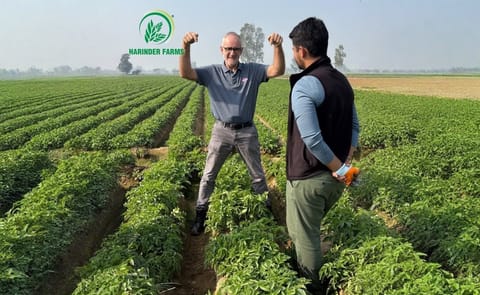Bulk potato storage for processing potatoes in the United Kingdom (Courtesy: Crop Systems Ltd)
Quality of Potatoes for Processing and the effect of Potato Storage; Some Basics

Earlier this week I looked over the older PotatoPro Newsletters and the topics that we have covered in each newsletter.
I concluded it was time to pay attention to one of the key aspects of potato processing, often underestimated and by those new to the industry sometimes even totally overlooked: the quality of the potato.
Quality requirements of Potatoes for Processing
The quality of the potato and the special requirements that there are for the main groups of potato products.
Whenever someone inquires about a production line for chips or french fries I try to find an opportunity to inquire about their access to potatoes suitable for processing and their knowledge about this aspect.
There are two main properties that can make or break the quality of your processed products - and as a result the success of a processing operation: reducing sugar content and dry matter content
Reducing sugar content
The amount of reducing sugars in the potato is responsible for the colour formation of the fried products. So if potatoes are to high in reducing sugars, they are not suitable for processing.
The maximum limits differ somewhat by product.

Maximum acceptable reducing sugar content in potatoes differs by final product
The effects of potato storage
It is also important to realize that the concentration of reducing sugars in potatoes is not at all static. Reducing sugars increase during storage, depending on the storage temperature.
The lower the storage temperature, the more reducing sugars are formed. That is why potatoes for potato chips - with the lowest tolerance for reducing sugars - are typically stored at 10°C and potatoes for french fries at a temperature of 6-8 °C.
Since table potatoes can be stored at temperatures as low as 4°C, this makes them totally unsuitable for processing. So the fact that stored potatoes are available, does not necessarily mean that stored potatoes for processing are available.
How to measure reducing sugars or frying colour?
Reducing sugar (glucose) can be measured directly, but frying the product under standardized conditions and than judging or measure the colour gives often more information.
Dry matter content
The other critical "invisible" potato characteristic for processing is the dry matter content. The dry matter is typically measured as weight in water. In the table below you can find the most suitable range for each product category.

Acceptable weight in water values depending on final product








